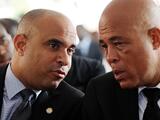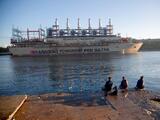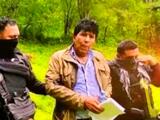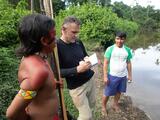Cuba's "army" in Venezuela: doctors or soldiers?
Lea este articulo en español

As the Trump administration turns up the pressure on Venezuela, it is increasingly pointing the finger at Cuba for propping up the government of Nicolas Maduro, considered a corrupt pariah by most of the world’s democracies.
U.S. officials insist that the presence of Cuban military advisors is undermining their efforts to break Maduro’s control of the country’s 250,000-strong military, the main pillar of support that they say is frustrating the international campaign to force out Maduro.
“The Cubans own the security apparatus,” in Venezuela, U.S. Secretary of State Mike Pompeo told Voice of America last weekend during a four-country swing through Latin America where he met with regional allies to bolster opposition to Maduro.
If the estimated 20,000-25,000 Cuban security forces that the U.S. says are in Venezuela were to leave, “Maduro would fall soon thereafter," White House National Security Advisor, John Bolton, told Univision on Wednesday.
He added; “Some call the country now ‘Cuba-zuela,’ reflecting the grip that Cuba's military and security forces have on the Maduro regime.
To be sure, the Cuban presence in Venezuela provides Maduro with welcome a political and military support, experts say. But it is unclear how many Cuban military personnel are operating in Cuba, what precise role they play, or how crucial they are to Maduro’s survival.
Cuba does not dispute it provides military training and assistance in Cuba but has provided few details. Instead, Havana proudly highlights what it calls its "army of white coats", a civilian contingent of 22,000 doctors and nurses who provide assistance to the Venezuelan health system in poor barrios under a longstanding social program of so-called ‘Missions.’
Former Cuban president Raul Castro recently hailed their work, noting that 61% of them were women. “Cuba is being blamed for all evils, using lies and the worst kind of Hitlerian propaganda,” Castro said. “We will never abandon our duty of acting in solidarity with Venezuela,” he added.
The United States spends hundreds of millions of dollars on military aid to Latin America has long had a foreign military presence in neighboring Colombia to combat drug trafficking and leftwing guerrillas, observers point out.
U.S. officials are increasingly turning to tighter economic sanctions against Cuba in an effort to force the island’s communist leaders to break with Venezuela.
Friends with oil
But, the U.S. strategy is running into a brick wall of ideological resistance thanks to Cuba’s dependency on oil-rich Venezuela which provides a vital source of cheap fuel for the island's power plants.
In recent weeks, Washington has sanctioned more than 40 vessels owned or operated by Venezuela’s state-owned petroleum company, PDVSA, as well as other companies that have delivered oil to Cuba, aiming to choke off the supply of crude.
The close ties that exist today between Cuba and Venezuela date back to the 1998 election of Hugo Chavez, a former military officer and avowed Marxist revolutionary who struck up a close friendship with Fidel Castro. The Cuban leader had been searching for several years for a wealthy new ally after the collapse of his longtime benefactor, the Soviet Union which had supplied him for decades with cheap oil in a barter swap for Cuban sugar.
Instead of sugar - Venezuela has plenty of that - Castro and Chavez came up with another, rather more unusual barter trade: oil in return for doctors and nurses to work in Venezuela’s poor slums, as well as an unknown number of military and intelligence advisers.
At its peak Cuba received an estimated 115,000 barrels of oil a day, about 80% of its domestic needs, and there were 25,000 Cuban medics and military personnel in Venezuela. It was a controversial deal, both economically and in medical terms, especially as the Cuban doctors received only a fraction of what Venezuela was paying, with the Cuban state pocketing the bulk of the cash.
Cuba’s medical exchange program, dubbed ‘Inside the Barrio‘ (Barrio Adentro) has saved the lives of 1.7 million people, Cuban officials say. They add that 225,000 Cubans have served in the medical ‘missions’ in Venezuela over the last 16 years, conducting 127 million medical appointments last year alone. Thousands of Venezuelan eye patients have also received treatment in Cuba under Operation Miracle, treating glaucoma and cataracts.
"Soldiers to defend Venezuela"
At a public event this week, the head of the Cuban missions in Venezuela, Julio García, told an audience that included Maduro and members of his cabinet, that the Cuban medical teams were “soldiers in the army enlisted … to defend Venezuela against the ‘gringos’ and against anyone else."
Despite statements like that, Cuba’s military support operates mostly out of sight.
In his prime, Fidel Castro was recognized as a master of intelligence and counter-intelligence measures, both to frustrate political enemies at home and to infiltrate enemies abroad, such as the United States. Brian Latell, the CIA’s top Cuba analyst for many years told Univision that Castro flipped as many as 50 agents, Cubans who had been recruited by the CIA to spy on Cuba. “The truth we later discovered was that they were almost all double agents working for Fidel,” he said.
Cuban "Liason Group'
Today, Cuban agents are believed to work closely with Maduro’s generals, running counter intelligence operations to spy on Venezuelan officers to ensure they don’t betray him. Venezuelan military defectors say the Cuban military cooperation is coordinated through the Cuba Cooperation and Liaison Group in Venezuela, known by its Spanish-language acronym GRUCE, a unit of several hundred soldiers dispersed through several military garrisons and headed by a Cuban general. Under the umbrella of the GRUCE, Cuban teams allegedly work closely with the Military Counterintelligence Directorate (DGCIM) and the Bolivarian Intelligence Service (SEBIN).
Cuba rejects that its generals are involved in training, or any form of “control” or “intimidation” in Venezuela, according to Foreign Minister Bruno Rodriguez.
But anecdotal evidence indicates that Cuban officers are posted in the offices of top Venezuelan officials and monitor what goes in and what goes out. " The Cubans have fully integrated themselves into Venezuela's security services, military, and into the basic functions of the state ... so they really know who is doing what in Venezuela," according to Eric Farnsworth, vice president of the Council of the Americas and Americas Society.
Spelling Bee
One businessman told Univision how he visited a relative, a colonel in the Venezuelan military, at the Defense Ministry in 2015 and had to pass through a security check manned by a Cuban security officer. "There was a Cuban officer in the room. I had some papers and had to give them to the Cuban adjutant," he said. The papers were for a Spelling Bee contest.
A Univision team witnessed firsthand the presence of Cuban officials in the Miraflores presidential palace when news anchor Jorge Ramos went to interview Maduro in March. “The Cubans control Miraflores … the inner security ring,” according to María Martinez, vice-president of Univision News, who traveled to Caracas with the Ramos crew for the interview. Martinez, and Univision producer, Claudia Rondon, who are both Cuban American, noted how security personnel who appeared to be giving orders in the palace spoke with unmistakable Cuban accents.
Oil production
Now, almost two decades after the oil-for-medics barter arrangement was created, experts wonder how much longer it can survive. For several years now, Venezuela’s oil production has been plummeting due to mismanagement, falling to barely 730,000 barrels a day. On top of that, the U.S. has placed Venezuela’s state-owned oil company, PDVSA, under sanctions. Venezuela is now only sending Cuba between 40,000-50,000 barrels of oil per day, experts say.
Given the current humanitarian crisis, Venezuela’s opposition leader and interim president, Juan Guaido, has tweeted that Venezuela’s oil would be better put to good use at home rather than in Cuba.
“Venezuela needs more than ever to leverage its resources, rather than fund dark purposes. For years, Cuba's interference was allowed, justifying it as an ideological brotherhood that was nothing more than giving away our oil,” Guaido said in the tweet, in which he estimated the value of the oil shipments at more than $2.5 million a day.
He also called for an end to Cuban military “interference” in Venezuela.
Similar allegations have also come from former top Venezuelan military officers, according to the BBC Monitoring Service, which tracks local media.
In a break with Maduro, retired General Hugo Carvajal, a former head of Venezuela’s intelligence, who is wanted by the US for drug-trafficking, tweeted in March that Guaido needed to “fumigate the Cuban plague.’’
He added that “the prime objective” of the Guaido government should be “to dismantle the Cuban intelligence apparatus and the mechanisms of control that they maintain in the government structure of our country”.
The question many people now ask if what will it take to get Cuba to pull out of Venezuela? It’s hard to say. Former U.S. officials say they the U.S. has attempted in the past to raise the issue of Venezuela with Cuban officials. But to no avail.
Non-starter
“The Cubans are not willing to engage with us on Venezuela. It’s a non-starter,” said Fernando Cutz, a former Senior Advisor to the White House National Security Council. “It’s not even something they are willing to discuss … in any way shape or form,” he added.
Cuba is looking around for alternative sources of oil, from places like Russia and Algeria which suggests they might be trying to wean themselves off Venezuelan crude.
While U.S. officials say they do not expect the sanctions to result in immediate political change in Cuba, they believe cutting off Venezuela’s subsidize oil shipments could at the very least force the island to open up its economy in order to buy more expensive oil on the global market.
But, recent ship tracking data shows tankers still plowing the 700-mile route between Venezuela and Cuba.
“Sometimes people think Maduro is winning, and yet he’s handed over all of his power to the Cubans, to the Russians,” Pompeo said last weekend. “This is weakness from Maduro. And so, this weakness will ultimately lead to his departure … I am very confident of that,” he added.



